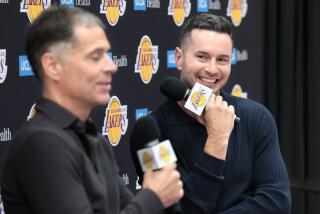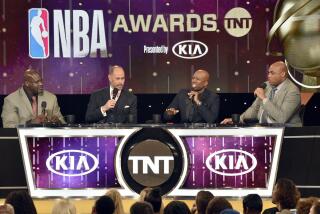In-game access is here to stay
- Share via
When is too much access, well . . . too much access?
Cringe-worthy TV is living and breathing among us in the form of the in-progress interview at a sporting event. You know, it’s the stepchild of the halftime interview, or the in-between periods chat with the coach and/or athlete and the reporter.
That would be the coach submitting through (mostly) gritted teeth and determined to say absolutely nothing of substance and the reporter gingerly dodging potential land mines (just where was Rafer Alston?) but doggedly determined to get something out of it.
Guess what?
It’s here to stay.
Lakers Coach Phil Jackson may mock it or mock Craig Sager’s jackets, by calling him Bozo the Clown, and in some cases, use the interviews to his advantage. Magic Coach Stan Van Gundy can get off a clever one-liner or fans at home get to see if smoke will ever come out of Gregg Popovich’s head, the Spurs’ coach is so clearly put out by the exercise.
NHL coaches are now doing it too and those who once used to refuse to submit to an interview on the bench are now obediently toeing the league line. There was Ducks Coach Randy Carlyle, not exactly Mr. Warm and Cuddly with the media, almost smiling (or maybe it was a grimace) during Game 2 of the Western Conference semifinals against Detroit.
“You know the reason I did it,” he said. “There is a fine of a substantial amount that I am susceptible for refusing to do it. It’s as simple as that. Unless you’re prepared to pay the fine . . . and I wasn’t prepared to pay that amount, then I guess I have to do it.”
There were, apparently, 10,000 good reasons to chat away.
Or to chat away and say absolutely nothing.
Jackson revealed in his 2004 book, “The Last Season,” about preparing “pithy, unrevealing responses” for the media in trying to disarm “the hordes for at least another 24 hours.”
That was obviously before Twitter became popular.
“I don’t understand the whole exercise of pregame comments,” Jackson wrote. “The league forced these mandatory sessions on us about five years ago, trying, I imagine to generate more stories, more buzz.
“But what am I supposed to tell the press. ‘Oh, yes, guys, this is what we’ll do against Golden State today. We’ll try more isolations with Gary [Payton], move Shaq over to the wing, and show them that we can’t play pick and roll. ‘Give me a break!’ ”
Well, Phil, why not? Why should we all wait for the next book or Jeanie’s next tweet?
But back to the reasons the in-game interviews are here to stay. First, it’s a toy and TV likes to play with toys. And, above all, just when you think these interviews are truly painful and decide to head to the kitchen for snacks after the third quarter, something interesting emerges.
ABC’s Doris Burke asked the right question after the first quarter Thursday night during Game 4 of the Lakers-Magic NBA Finals, noting the foul trouble of the Lakers’ big men, asking why that was happening.
That’s when Jackson must have realized this was a perfect opportunity to use something he really doesn’t like all that much to his benefit.
“Uh . . . I don’t know. They’re just tangled up in there,” Jackson said. “I don’t know what the referees are seeing out there. There’s some bogus calls out there. . . .”
That’s about as good as it gets.
Unless the coach happens to be Penn State’s Joe Paterno and simply refuses to do a Rose Bowl pregame interview with ABC.
In dealing with the all-access, all-the-time issue, you could say there are two methods. There’s the Phil approach and the JoePa way: Use it or lose it.
--
More to Read
All things Lakers, all the time.
Get all the Lakers news you need in Dan Woike's weekly newsletter.
You may occasionally receive promotional content from the Los Angeles Times.







